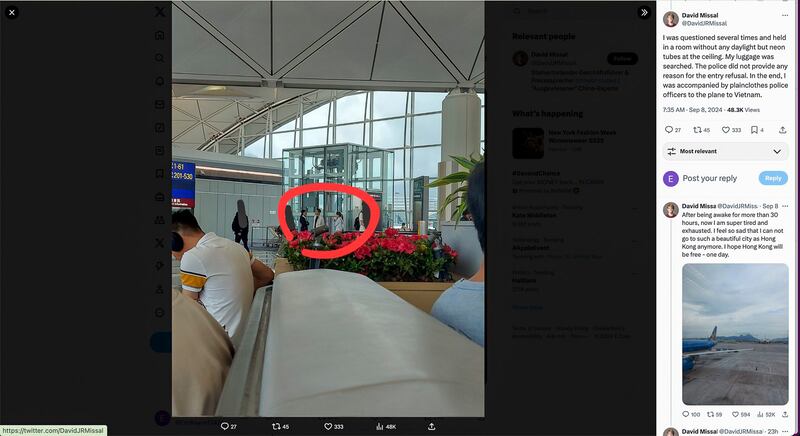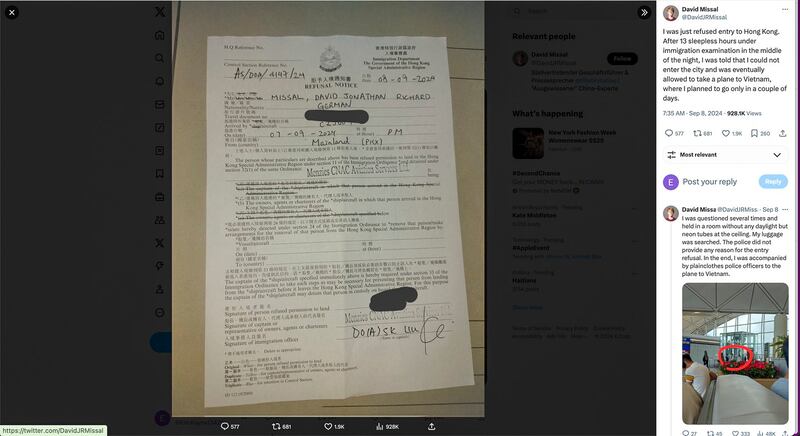Read coverage of this topic by RFA Mandarin, RFA Tibetan or RFA Cantonese.
Authorities in Hong Kong have interrogated and denied entry to a German rights activist amid warnings from the United States of growing personal and business risks for those traveling to the city.
Immigration officers turned away rights activist David Missal, deputy managing director & press officer for the Berlin-based Tibet Initiative Germany, after he arrived at Hong Kong International Airport on Sept. 7 from Beijing's Daxing International Airport, according to a copy of an official "Refusal Notice" he shared to his X account on Sunday.
"I was just refused entry to Hong Kong," Missal, who is also the co-founder of a group called Freedom for Hong Kong, wrote in his X post.
"After 13 sleepless hours under immigration examination in the middle of the night, I was told that I could not enter the city and was eventually allowed to take a plane to Vietnam."
Missal, who isn't the first foreign rights activist to be denied entry to Hong Kong, described being "questioned several times and held in a room without any daylight," adding that immigration officers also searched his luggage.
"The police did not provide any reason for the entry refusal. In the end, I was accompanied by plainclothes police officers to the plane to Vietnam," Missal wrote, adding that he had been allowed to enter mainland China for two weeks on a visa waiver program with no issues.
"I hope Hong Kong will be free – one day," he said.
Eroding freedoms
Ray Wong, who heads Freedom for Hong Kong, said the erosion of the city's freedoms was clear to all, including foreign passport-holders.
"That Hong Kong has become less free is something not only we, who come from Hong Kong, notice," Wong said in a statement. "Foreigners are also not safe from the regime's arbitrariness. The National Security Police has become an instrument of repression."
Tenzyn Zöchbauer, executive director of Tibet Initiative Germany, strongly condemned the treatment of Missal.
"It is unacceptable that even private travelers with critical voices are denied entry," Zöchbauer said. "These measures are not only an alarming sign of the ongoing loss of Hong Kong's autonomy but also a clear violation of international human rights standards."
Missal told RFA Mandarin in a later interview from Vietnam that the move was an example of China's "transnational repression."
"The Hong Kong government and a lot of authoritarian countries are doing this now; I think it's very common," he said. "It's pretty scary."

Yet Missal was allowed to enter China, spending time in Beijing and southwestern Sichuan province in a private capacity before boarding the plane to Hong Kong.
This suggests the city's officials are now even more zealous than their mainland Chinese counterparts when it comes to turning away "undesirables."
"I feel like Hong Kong is the same as mainland China now, or it may be more strict, which is a real shame," Missal said, adding that he didn't know if the incident would affect his ability to go back to mainland China in future.
Personal details probed
From Sept. 3, anyone traveling to Hong Kong will have their personal details sent to the city authorities before they board their flight, making it easier for officials to turn away foreign journalists, members of international organizations, and anyone else they see as "undesirable" before they travel.
Missal's denial of entry came as the U.S. government issued risk advisories to American citizens and businesses, warning them of "personal safety and legal risks" when traveling to Hong Kong or doing business there.
Five government departments issued a statement to "highlight new and heightened risks" to U.S. companies operating in Hong Kong in the wake of the latest national security legislation, known as "Article 23."
"Hong Kong’s diminishing autonomy from the central government of the People's Republic of China, creates new risks for businesses and individuals in Hong Kong that were previously limited to mainland China," the departments said in a joint statement dated Sept. 6.

The warnings were aimed at individuals, businesses, academic institutions, media organizations, research service providers and investors operating in Hong Kong, it said.
"The vaguely defined nature of the law and previous government statements and actions raise questions about risks associated with routine activities," it said, in a reference to the " Article 23" legislation passed in March.
The U.S. State Department has warned Americans to "exercise increased caution when traveling to the Hong Kong Special Administrative Region (SAR) due to the arbitrary enforcement of local laws" since April 2024, when its advisory was updated following the implementation of Article 23.
‘I don’t think this ploy will succeed’
The Hong Kong government rejected the advisory as "misleading and untruthful," accusing Washington of "trying to create panic."
The city's second-in-command, Chief Secretary for the Administration Eric Chan said the U.S. advisory was an attempt to suppress China’s rise.
“The National Security Law has been enacted for a long time and we can all see that we have never groundlessly arrested any business people,” Chan told reporters on Saturday.
The warnings “involve an element of intimidation, to scare away business people hoping to invest in Hong Kong. I don’t think this ploy will succeed,” Chan said.
Anouk Wear, U.S. Research and Policy Advisor for the London-based rights group Hong Kong Watch, welcomed the U.S. advisory, however.
“This advisory ... rightly highlights the new and increased risks of operating in Hong Kong," Wear said in a statement, which called for further sanctions on Hong Kong officials responsible for ongoing human rights violations
"We urge American businesses and citizens in Hong Kong to take this seriously and reconsider the risks of remaining in the city, in addition to the decreasing rights and freedoms on the ground."
Translated and edited by Luisetta Mudie. Edited by Malcolm Foster.
